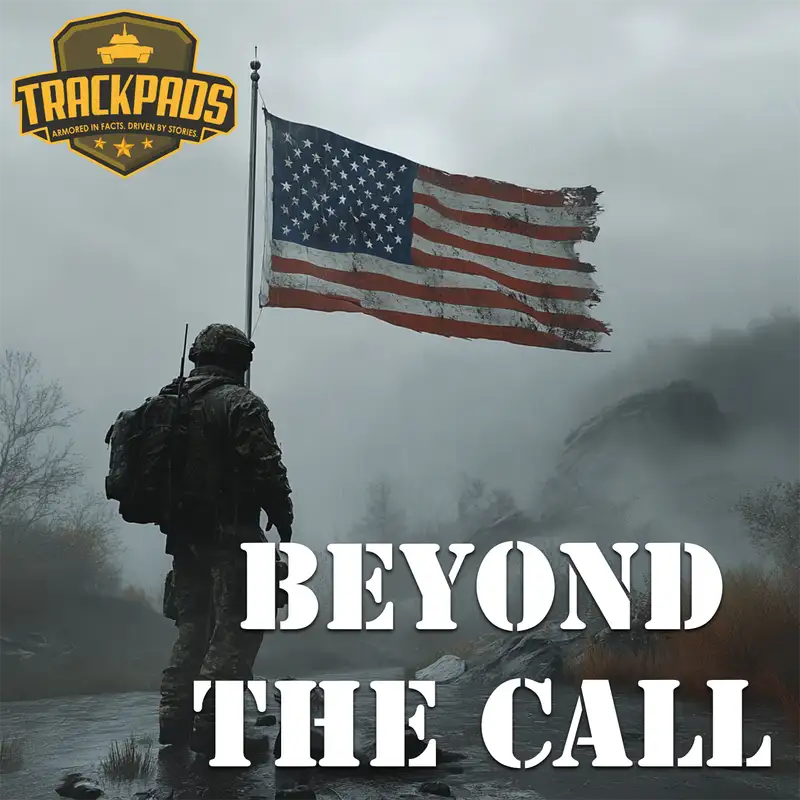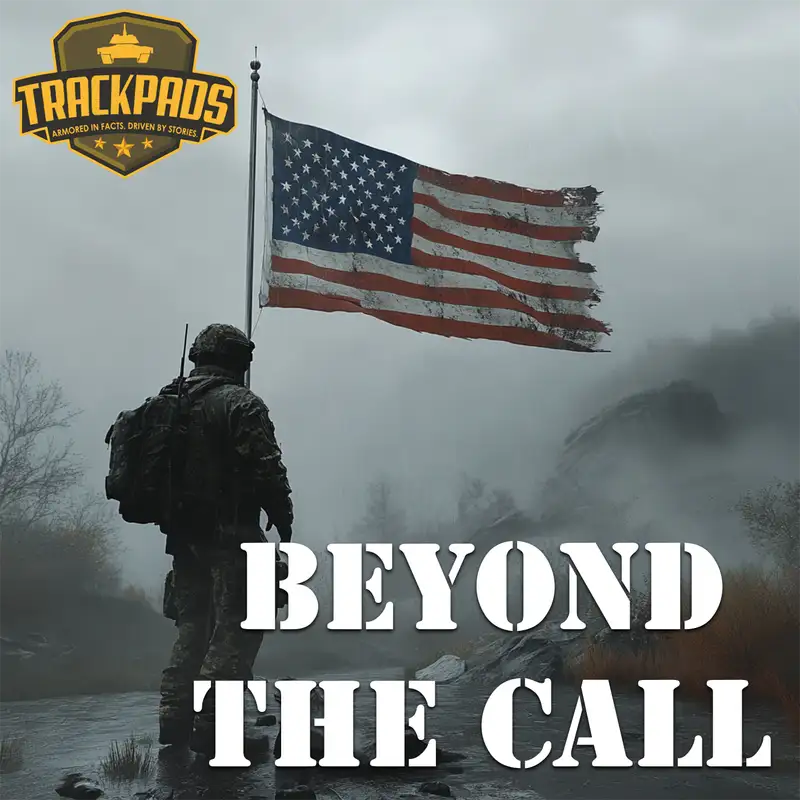William R. Jecelin: Sacrifice and Valor on the Ridge at Saga
Welcome to Beyond the Call, where history, leadership, and heroism come alive.
Today’s episode explores the extraordinary bravery and ultimate sacrifice of Sergeant William R. Jecelin, a powerful story of courage and perseverance.
If you enjoy learning more about military history and extraordinary individuals, be sure to visit Trackpads dot com for articles, podcasts, and more.
Introduction
Sergeant William R. Jecelin distinguished himself through an extraordinary act of bravery during the Korean War, an act that would posthumously earn him the United States military’s highest decoration, the Medal of Honor.
His courageous sacrifice came amidst intense fighting on September nineteenth, nineteen fifty, near Saga, Korea, where he led his platoon against heavily armed enemy positions.
Jecelin's selfless actions not only saved the lives of his fellow soldiers but exemplified the ultimate spirit of military heroism.
His name has since become synonymous with valor and sacrifice among those who served in the Korean War.
In a defining moment during the fierce battle for control of a critical saw-toothed ridge, Sergeant Jecelin saw a grenade thrown directly into his platoon’s position.
Without hesitation, he acted decisively to shield his comrades from certain death, using his own body to absorb the explosion.
This dramatic and selfless act is vividly captured by those who survived, forever marking Sergeant Jecelin's story as one of exceptional heroism under fire.
His bravery continues to inspire generations, a poignant reminder of the extraordinary courage required in moments that call soldiers beyond their duty.
Historical Context
The Korean War, spanning from June nineteen fifty to July nineteen fifty-three, was a pivotal Cold War conflict that saw the first major armed confrontation between forces aligned with communist and democratic ideologies.
North Korean forces, supported by the Soviet Union and China, launched a surprise invasion of South Korea, aiming to reunify the peninsula under communist rule.
In response, the United Nations swiftly assembled a coalition led primarily by the United States, demonstrating a global determination to halt communist expansion.
The war rapidly evolved into a brutal, grinding conflict that tested international resolve and military strategy.
Within this larger conflict, the Battle of the Pusan Perimeter emerged as a critical early confrontation.
Taking place from August to September nineteen fifty, this battle was essential in preventing the collapse of South Korea.
United Nations forces, including American troops, formed a defensive perimeter around the port city of Pusan, desperately holding off relentless North Korean attacks.
The intensity of combat during these critical weeks underscored both the strategic importance of this foothold and the resolve of those tasked with its defense.
Sergeant William R. Jecelin served with Company C, Thirty-fifth Infantry Regiment, Twenty-fifth Infantry Division, a unit deeply involved in defending the Pusan Perimeter.
The Twenty-fifth Infantry Division, known as "Tropic Lightning," had a distinguished history of combat service and was renowned for its swift and decisive actions under challenging conditions.
Their deployment at the perimeter was instrumental in providing essential reinforcements to stabilize the front lines.
As the North Korean forces intensified their assaults, the men of the Twenty-fifth Infantry faced increasingly difficult and desperate fighting conditions.
The geographical landscape near Saga, Korea, where Sergeant Jecelin’s act of heroism occurred, significantly impacted combat operations.
Characterized by rugged terrain, rocky hills, and narrow valleys, the landscape favored entrenched defensive positions and fierce, close-quarter combat.
Both sides understood the tactical importance of controlling high ground, as these positions provided vantage points for artillery, observation, and defense.
The fight for these hills often devolved into costly and brutal engagements, exemplified by the intense struggle for the ridge Jecelin's unit sought to secure.
Politically and militarily, the defense and subsequent breakout from the Pusan Perimeter set the stage for General Douglas MacArthur’s daring Inchon Landing, which occurred shortly afterward.
The successful Inchon operation shifted the momentum of the war, forcing North Korean troops into retreat and providing United Nations forces the initiative to push back northward.
Sergeant Jecelin’s sacrifice, among countless other acts of valor during the desperate stand at Pusan, helped ensure that strategic positions were maintained, ultimately contributing to this pivotal shift in the Korean War's trajectory.
Personal Background
William Russell Jecelin was born on May sixth, nineteen thirty, in Baltimore, Maryland.
Growing up in this bustling city, Jecelin witnessed firsthand the aftermath of World War Two, a time when patriotism and service were deeply woven into the fabric of American society.
Driven by a profound sense of duty and inspired by the stories of bravery and sacrifice from the recent global conflict, Jecelin enlisted in the United States Army.
After completing rigorous training, he was deployed to Korea as a member of Company C, Thirty-fifth Infantry Regiment, Twenty-fifth Infantry Division, ready to serve his country during one of the early, pivotal conflicts of the Cold War.
Tragically, Sergeant Jecelin’s service in Korea ended in sacrifice on September nineteenth, nineteen fifty, at only twenty years of age.
His remarkable act of heroism not only exemplified his courage but permanently etched his name into military history.
Jecelin's body was respectfully returned to his hometown and laid to rest in Bohemian National Cemetery in Baltimore, Maryland.
His legacy lives on through continued remembrance, ensuring future generations understand and appreciate the true meaning of valor and sacrifice in service to one's country.
Medal of Honor Citation
"Sgt. Jecelin, Company C, distinguished himself by conspicuous gallantry and intrepidity above and beyond the call of duty in action against the enemy.
His company was engaged in an attack against a strongly fortified enemy position on a ridge.
The enemy, from their commanding positions, delivered heavy automatic weapons and grenade fire, which pinned down his unit and inflicted heavy casualties.
Realizing that the situation was becoming increasingly desperate, Sgt. Jecelin courageously led a squad up the steep slope through intense hostile fire to assault the enemy positions.
As the squad approached the crest of the hill, enemy troops threw grenades at them.
Without hesitation, Sgt. Jecelin threw himself upon one of the grenades, absorbing the full impact of the explosion with his body.
His heroic self-sacrifice saved the lives of his comrades and enabled his unit to continue its mission successfully.
Sgt. Jecelin's supreme sacrifice reflects the highest credit upon himself and upholds the finest traditions of military service."
The Battle and Medal of Honor Actions
On the morning of September nineteenth, nineteen fifty, Sergeant William R. Jecelin and his fellow soldiers of Company C, Thirty-fifth Infantry Regiment, prepared to assault a strategically crucial ridge near Saga, Korea.
Enemy forces held a commanding advantage, heavily entrenched in fortified positions atop the rocky and steeply inclined terrain.
Facing relentless gunfire and explosive resistance, the soldiers knew the fight ahead would be arduous and unforgiving.
Sergeant Jecelin, fully aware of the risks, steadied his squad and readied them for the perilous climb.
As the soldiers moved forward, enemy troops unleashed intense automatic weapon fire, showering the hillside with a deadly hail of bullets.
Grenades and mortars exploded around them, sending shards of shrapnel and clouds of dust and debris into the air.
Despite the chaos, Jecelin maintained his composure, methodically guiding his squad toward the enemy strongpoints.
His leadership under fire inspired confidence, compelling his men forward through sheer determination and force of will.
As they approached the crest of the ridge, enemy forces intensified their barrage, desperate to halt the advancing American squad.
Explosive grenades rolled down the steep incline toward the approaching soldiers, threatening catastrophic casualties.
Recognizing the immediate danger, Sergeant Jecelin called out warnings, attempting to shield his comrades from the lethal blasts.
Yet, amid the confusion and smoke, one grenade landed perilously close, threatening to decimate the group.
In a decisive, selfless act, Sergeant Jecelin instantly dove onto the live grenade, fully covering it with his body.
The violent explosion shook the ground beneath their feet, yet Jecelin’s sacrifice effectively absorbed the grenade's deadly force.
His action, driven purely by instinctive courage and devotion to his men, ensured the survival of the squad members around him.
This act of bravery not only preserved the lives of his immediate comrades but allowed the assault to continue without interruption.
Galvanized by their sergeant's sacrifice, Jecelin’s comrades surged forward with renewed determination, capturing the ridge and driving the enemy from their fortified positions.
Securing this strategic ground significantly boosted the morale and tactical position of the United Nations forces in the region.
The success of their assault was pivotal, breaking through enemy defenses that had previously seemed impenetrable.
Sergeant Jecelin’s bravery had directly influenced this critical turning point.
In the aftermath of the battle, the men of Company C solemnly reflected on Sergeant Jecelin’s extraordinary heroism and selflessness.
His sacrifice epitomized the highest values of soldierly virtue and comradeship, leaving an indelible mark on all who served alongside him.
Recognizing his incredible courage and sacrifice, the United States military posthumously awarded Sergeant Jecelin the Medal of Honor, forever memorializing his selfless act as a defining example of valor above and beyond the call of duty.
Reflections and Lessons Learned
Sergeant William R. Jecelin’s story provides powerful insights into selfless leadership and courage in moments of crisis.
His willingness to place his own life at risk to save others exemplifies an extraordinary commitment to the welfare of his team, a core principle of military leadership that remains profoundly relevant today.
Modern leaders, whether military or civilian, can draw inspiration from his decisive action, learning that true leadership often requires immense personal sacrifice.
Jecelin's ultimate act of bravery stands as a testament to the enduring value of placing others' lives and well-being above one's own.
Furthermore, Sergeant Jecelin's heroic sacrifice underscores the timeless importance of training, discipline, and readiness under pressure.
His immediate response to danger, without hesitation or doubt, was the result of rigorous preparation and deeply ingrained duty to his comrades.
This teaches contemporary military personnel and civilians alike that bravery is not simply a spontaneous reaction but a cultivated state of mind and spirit.
Continuous training, preparedness, and dedication to duty remain essential components in developing the resilience required to face critical, high-stakes situations effectively.
Finally, Sergeant Jecelin’s story serves as an enduring reminder of the cost of freedom and the profound responsibilities borne by those who defend it.
His courage and sacrifice should inspire reflection on the broader ethical responsibilities each individual holds within society.
His legacy challenges current and future generations to live lives of purpose, integrity, and dedication, encouraging them to find ways—large or small—to positively impact others.
The profound lessons embodied in Jecelin’s story continue to resonate, reminding us all of the potential for heroism within everyday actions and choices.
Closing
Sergeant William R. Jecelin’s extraordinary bravery and ultimate sacrifice remain a compelling reminder of the highest ideals of courage, selflessness, and leadership.
His legacy, enshrined through his Medal of Honor, challenges us to reflect on the profound meaning of service and sacrifice.
In our next story of Beyond the Call, we’ll delve into another remarkable tale of heroism that transcends ordinary duty.
Subscribe to our series or share this story to honor these timeless acts of valor and ensure their lessons continue to inspire generations.
Thank you for joining me on today’s episode of Beyond the Call.
If you’d like to dive deeper into more stories of bravery, leadership, and history, visit Trackpads dot com.
Until next time, keep exploring, stay inspired, and remember—the lessons of the past shape the warriors of the future.

